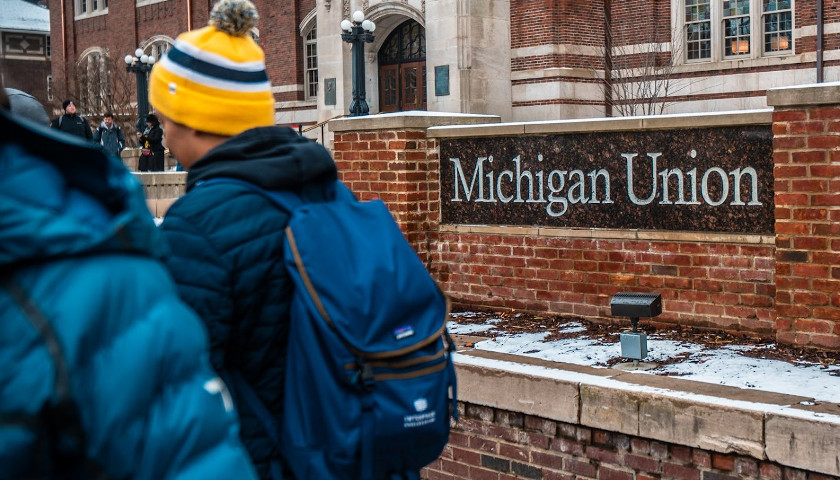by Wade Vellky
New faculty training courses at the University of Michigan this fall ask employees to check their “privilege,” use “inclusive language” for LGBTQ+ individuals, and respond to “harmful microaggressions” on campus.
The university’s Department of Organizational Learning is offering the courses as part of its diversity, equity and inclusion initiative – a campus-wide effort that includes students as well as faculty and staff.
Three of the fall employee training classes, offered in congruence with the university’s Department of Human Resources, are designed to expand employees’ DEI “knowledge,” according to a summary published by the university.
One course, “Change It Up!” seeks to train individuals on “bystander intervention skills,” which involve intervening “in situations that negatively impact individuals, organizations, and the campus community,” the course description states.
Another training offered to faculty and staff this fall, “Understanding Privilege,” teaches individuals to recognize “privilege” and understand it with respect to diversity, equity and inclusion, the course description states.
The third course, “LGBTQIA+: An Introduction to Inclusive Language,” instructs employees to “affirm” the needs of a diverse and “inclusive” community and to build strategies to practice using inclusive language, according to the course description.
Similar courses have been offered to students at the university, such as one in 2022 that taught on “strategies to intervene and disrupt harm, such as microaggressions, bias incidents, stereotyping, sexual harassment, etc.”
The course also taught students how to “act as an ally and educator, especially when you hold privilege and power and witness harm to those who do not hold privilege and power” and “receive and respond to feedback about harm you caused, even if unintentional.”
The College Fix contacted the faculty course facilitators and Sonya Jacobs, head of the Department of Organizational Learning, twice within the past month, but no one responded. The Fix asked the instructors to share their presentation materials, their goals for the course and their response to those who say such courses advocate for a certain political perspective.
The implementation of the employee training courses is part of a broader initiative by the University of Michigan to promote DEI principles on campus.
Currently, the university is developing a new strategic plan to “enhance diversity, increase the inclusiveness of the academic community and promote greater equity throughout the campus.” Scheduled to be released in October, it will outline DEI goals “in all schools, colleges and additional units across the university” through 2025, the university states on its website.
Some higher education watchdogs have voiced concern about massive DEI efforts in higher education. Jay Greene, a senior research fellow in the Center for Education Policy at the Heritage Foundation, a conservative think tank, told The College Fix that DEI ideology contradicts the long-standing American principle of equal treatment under the law.
“Instead, the DEI worldview holds that there are different categories of people (oppressors and oppressed) who are deserving of different treatment by members of their group membership,” Greene said via email.
Another concern is “DEI bureaucracies articulate and enforce an ideological orthodoxy on university campuses. Imposing an orthodoxy on legitimate matters of scholarly debate and discussion is antithetical to the mission of a university,” he said.
But the University of Michigan stated publicly it believes the key reason why DEI should be implemented is to create an “environment in which differences are valued and celebrated,” it states in the article “Communicating Why We Work on DEI.” Students and faculty should have an “equal opportunity to thrive and succeed” and to be diverse in the “broadest sense of that word,” it continues.
The overall goal of designing the strategic plan is to make DEI a “fundamental value that impacts and benefits every individual and every aspect of campus life,” and to “build it into the organization’s DNA,” according to the university.
The efforts by the University of Michigan also are part of a larger, nationwide effort to promote DEI programs among higher education faculty and staff.
Furthermore, the National Education Association, the largest U.S. labor union representing faculty and professors at public colleges and universities, also has several programs that teach DEI-related content.
One of the key goals of the NEA is the promotion and creation of “just and equitable schools.” On its “Mission, Vision, and Values” page, it mentions another goal is to create a “just society” and “equal opportunity” in public education. The NEA also has published articles and resources to promote these goals.
The nationwide promotion of DEI-related programs in public colleges and universities and in everyday life has been polarizing among the general population.
Several polling outlets, such as a 2022 poll from Pew Research, show a plurality of American voters support laws prohibiting the teaching of gender identity and other DEI-related programs in elementary school education.
On the collegiate level, opinions among university professors and faculty members appear to be split. According to a 2022 survey by the Foundation for Individual Rights and Expression, or FIRE, three in four politically liberal professors supported DEI-related programs, but 90 percent of conservative and 56 percent of moderate professors viewed these types of programs as “political litmus tests.”
– – –
Wade Vellky is a reporter at The College Fix.
Photo “University of Michigan Campus Union” by University of Michigan.








